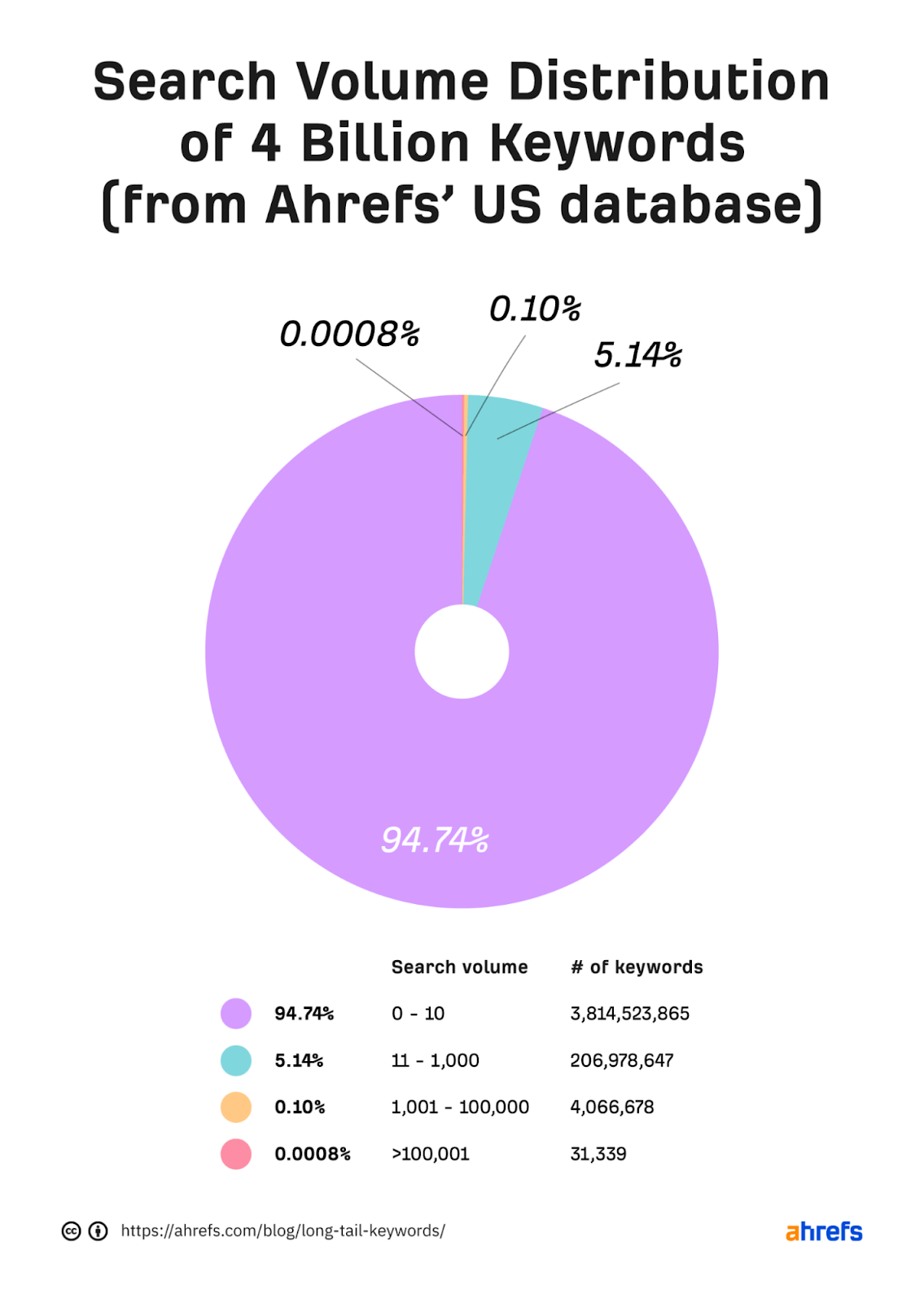Keyword research is like a puzzle with no one-size-fits-all solution. These steps lay out a specific method for diving into keyword research, but companies can mix it up based on their own goals and priorities.
Step 1: Get to know your customers and their objectives
Achieving success in your content strategy doesn't solely rely on high search volumes. Even if a keyword has low monthly search volume, it's still important to focus on topics that are crucial for your customers. Remember, search volume reflects industry demand, and by creating valuable content, you can generate your own demand and search volume growth. With over 92% of keywords receiving ten or fewer monthly searches, it's clear that prioritising topics based solely on search volume thresholds isn't always necessary.

Naturally, it's essential to target keywords with a decent search volume, but the key is to focus on topics that resonate with your customers and align with their search interests.
Craft your buyer personas with SEO considerations in mind
What exactly are your ideal customers searching for on the internet? What specific terms and phrases do they typically employ?
What is a buyer persona?
A slightly made-up portrayal of your dream customer based on actual data and a bit of savvy guesswork about demographics, behaviors, motivations, and goals.
Step 2: Determine the topics you aim to become synonymous with
Identify the topics that really click with your audience and are spot-on for your business. For instance, think about topics like "digital marketing" for Captivate Consulting or "budget weddings" for a wedding planner as prime areas to focus on. Don't overwhelm yourself by trying to cover everything at once; instead, prioritise topics that align with your customers' interests and search behavior to tailor your content strategy effectively.
Step 3: Discover the online search trends that pique the curiosity of your target audience
Dive deep into the main topics and then narrow your focus.
After identifying your topics, take a closer look to find keywords that align with them. Your topics act as the building blocks; use your preferred keyword tool to discover phrases that are connected or relevant to that central topic.
For example, when considering the topic of "marketing automation," related keywords may include "marketing automation tools," "what is marketing automation," "email marketing automation," and more. This is not an exhaustive list of keywords but rather a brainstorm of phrases that potential customers may use when exploring a specific topic area.
Keyword research tools
"Searches related to" and auto suggestions in Google are a simple way to get started.


Other recommended tools are Google Keyword Planner, Moz Keyword Explorer, and Answer the Public.
Keyword research extensions
Install Chrome extensions like Keyword Surfer and KeywordsEverywhere to get keyword ideas while you're
browsing Google.
Step 4: Take note of the search volume and competition levels
Use your favorite keyword research tool to analyse the monthly search volume and competition levels for each keyword you're eyeing. While there isn't a one-size-fits-all rule for the ideal search volume, it varies by industry. Avoid wasting time on keywords with zero search volume and steer clear of highly competitive terms dominated by big players.
Focus on keywords that offer the best ROI based on your unique situation and website authority. Take cues from existing top-ranking content, but add your own flair to stand out. Tailor your content format to what works - for example, if lists are popular, give yours a unique spin with extra info, visuals, or other value-adding elements. This strategy will set you apart and drive more engagement from your audience.
Keep an eye out for those trendy keywords
Use Google Trends to see whether the search volume for your chosen keyword is going up or down. As your SEO strategy starts to take off, another fun way to ramp up your keyword research is by checking out what your competitors are up to.
Simply find out which keywords your rivals are ranking for that you're not. Many handy keyword research tools, like Moz, Ahrefs, and SEMrush, offer features that make this process a breeze. Or, you can always do a quick Google search incognito to see who's nabbing those top spots.
This nifty trick helps ensure that the keywords you uncover are a perfect match for your audience. After all, the more competitors ranking for these keywords, the more you'll want to join in on the action.
Step 5: Group your keywords into topic clusters
Think of topic clusters as the ultimate content organisation strategy for both your audience and search engines. Once you have your list of keywords ready, group them into themed clusters that revolve around a specific topic. Consider factors like search volume, keyword type, and trends, and remember to focus on a single keyword or key phrase per page.
Step 6: Decide which topic cluster to tackle first
Deciding which topic cluster to dive into first is like choosing the perfect outfit for a special occasion - it all depends on your goals and the search intent behind those snazzy keywords. Each keyword brings its own flair to the table, with some guests arriving fashionably early in their purchasing journey, while others strut in fashionably late.
The journey that customers embark on when conducting research before making a purchase is often humorously dubbed as the "buyer's journey", complete with three unique stages, Awareness, Consideration and Decision stage.
Understanding the buyer's journey is crucial in determining the keywords people use when searching. Keywords starting with "what is" indicate a searcher in the early learning stages of a topic, aligning with the Awareness stage of the buyer's journey. This type of content is ideal for creating pillar pages to support further content. For instance, if you sell ERP systems, a perfect Awareness stage keyword for a pillar page could be "What Is ERP?". On the other hand, keywords containing "how to" suggest searchers looking to solve a problem, possibly in the Consideration or Decision stage. For our ERP reseller example, a page on "How To Implement an ERP" could cater to those farther along in their buyer's journey. This targeted approach allows for strategic call-to-actions like signing up for a free demo or scheduling a consultation with a technical consultant.
Understanding where your keywords fit in the buyer's journey is key. This info will help you prioritise which keywords to tackle first, and predict the traffic and conversions they could bring. If you're in a new industry or just starting out, starting with Awareness stage content can build a solid foundation of expertise for your future content.
Now that your keywords are organised and ranked, it's time to dive into creating or revamping your content. This is where your keyword research seamlessly transitions into the world of content marketing.


